Module 7 Great books 模块导学课件
文档属性
| 名称 | Module 7 Great books 模块导学课件 | 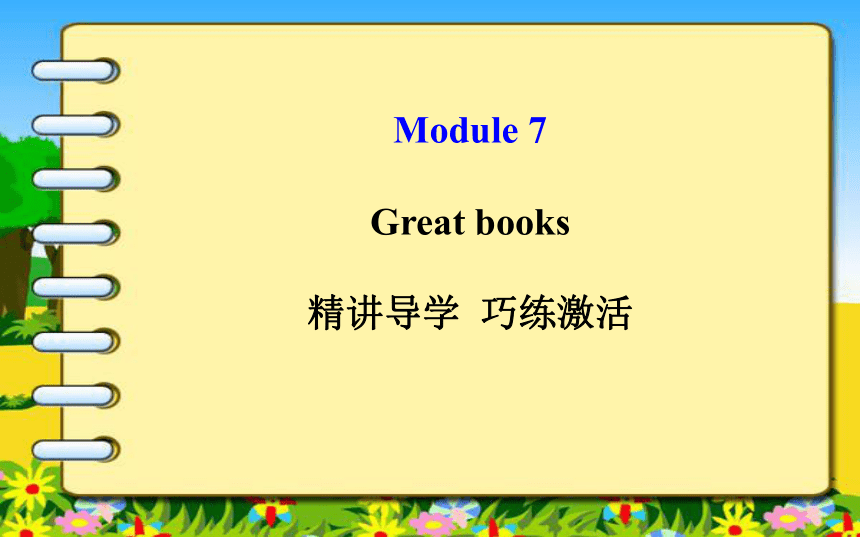 | |
| 格式 | zip | ||
| 文件大小 | 3.7MB | ||
| 资源类型 | 教案 | ||
| 版本资源 | 外研版 | ||
| 科目 | 英语 | ||
| 更新时间 | 2014-11-21 00:14:23 | ||
图片预览

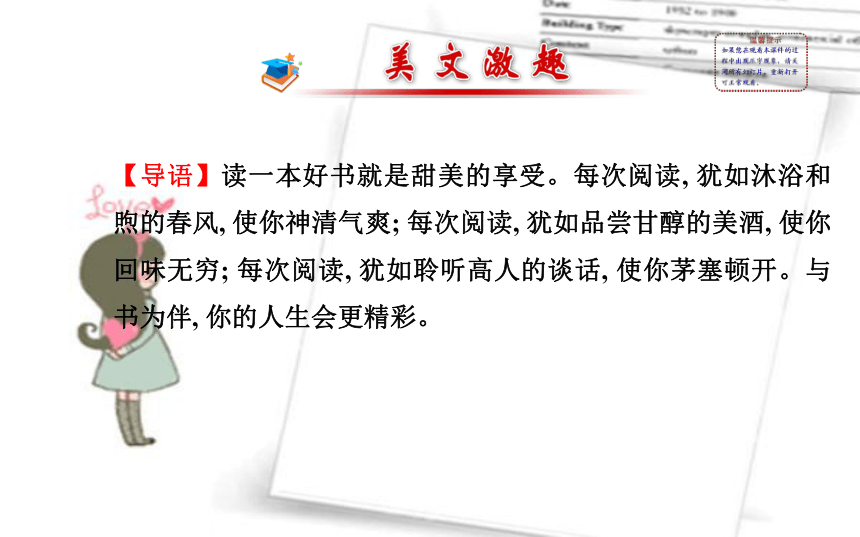
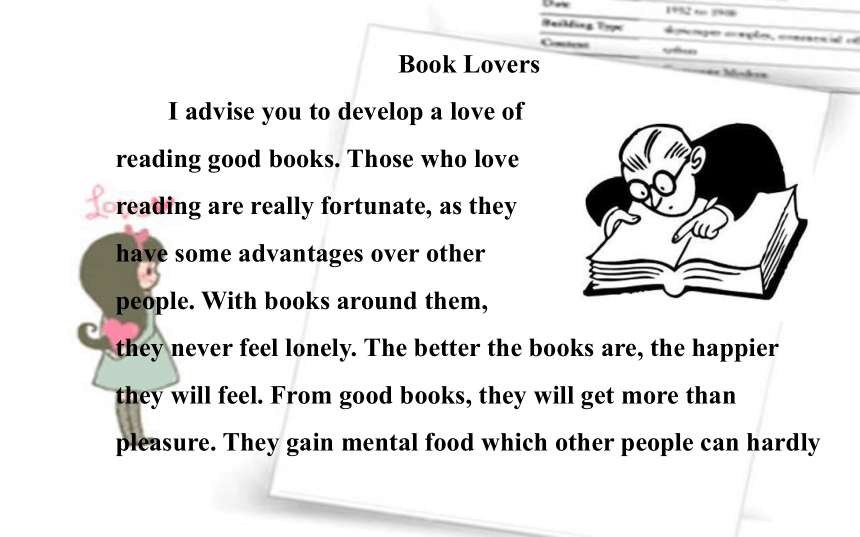
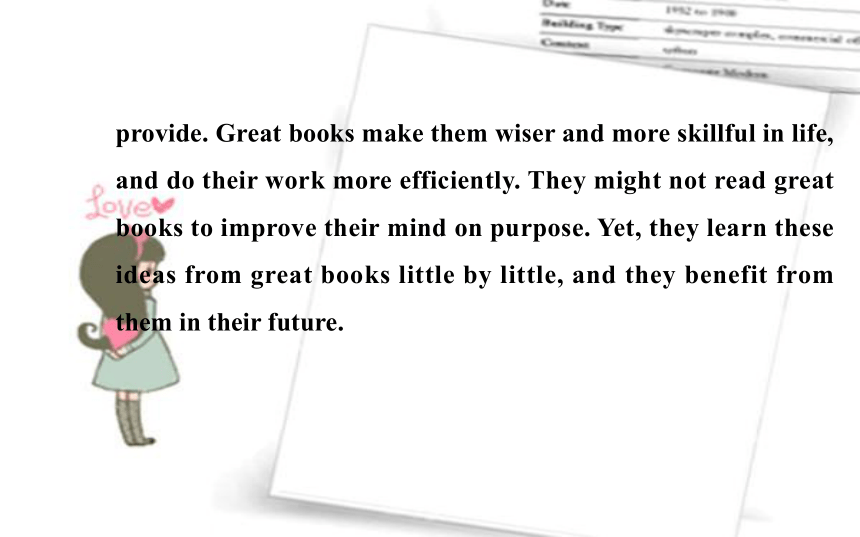
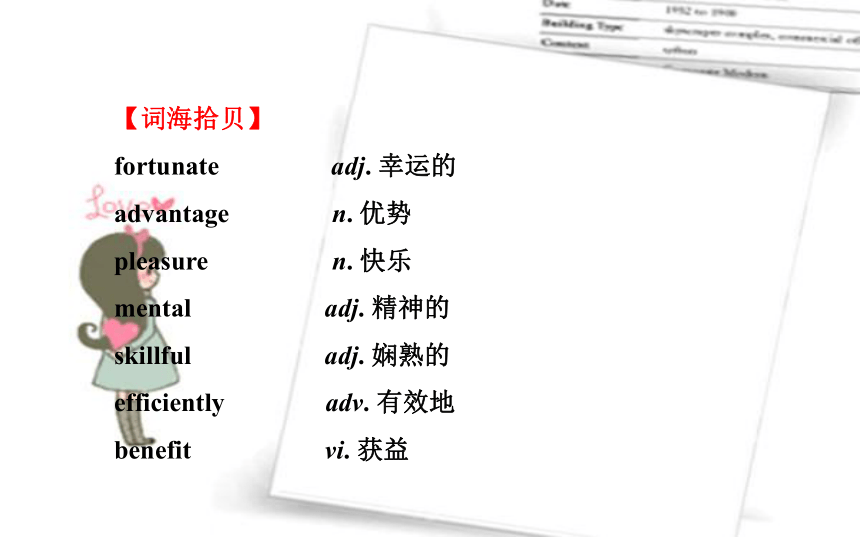
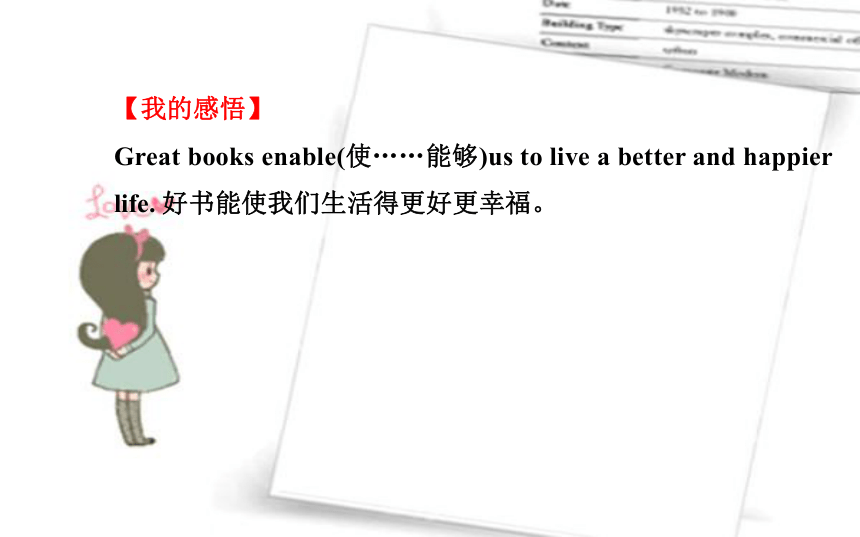
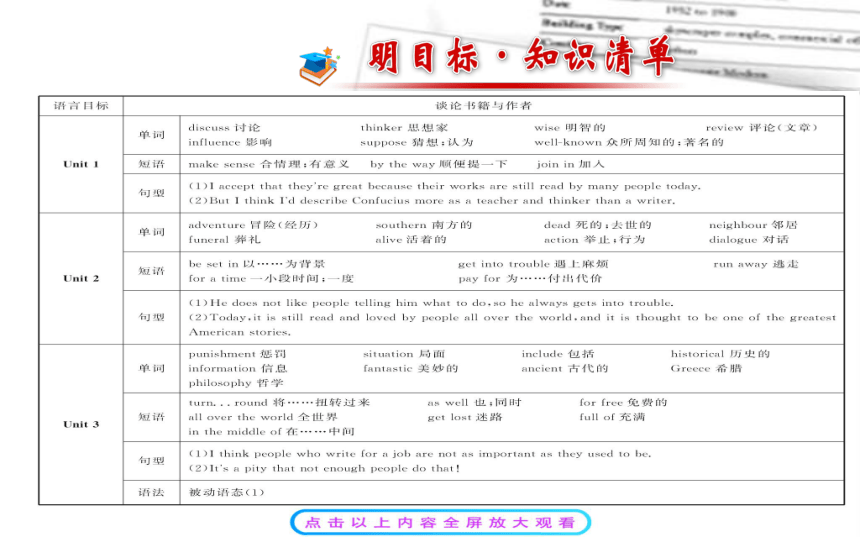
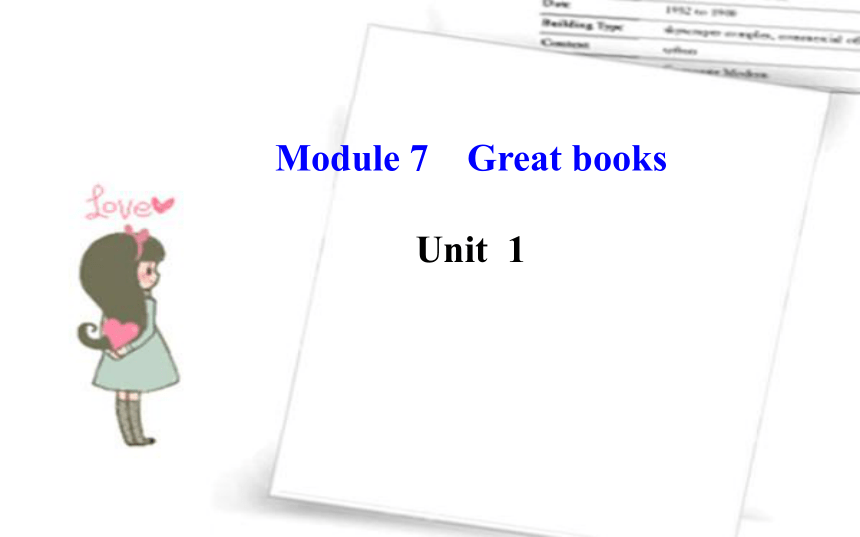
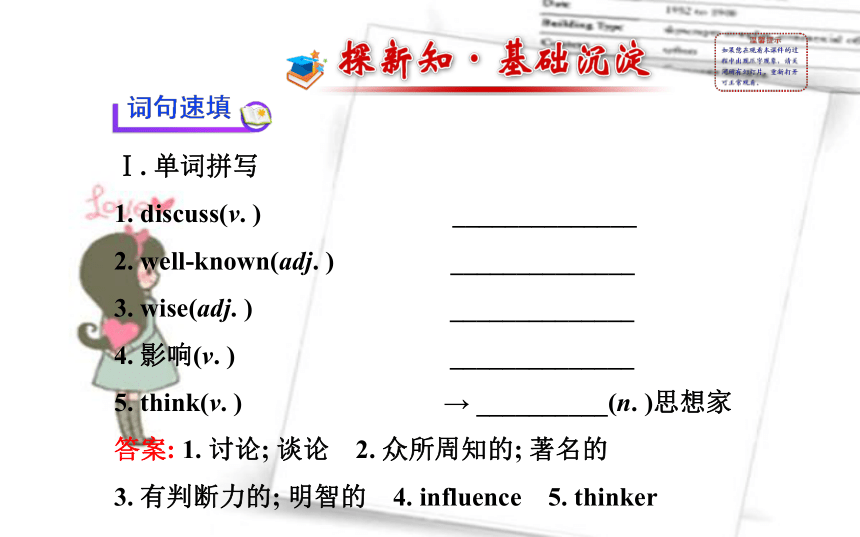
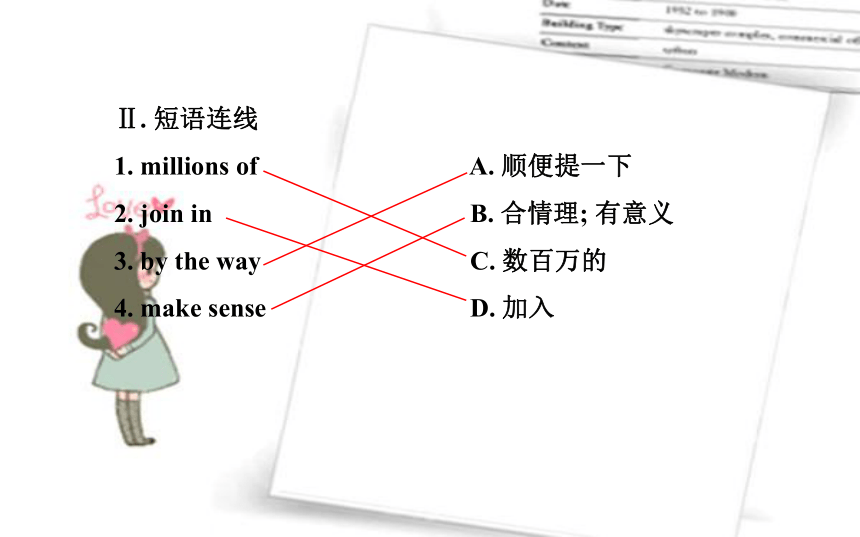
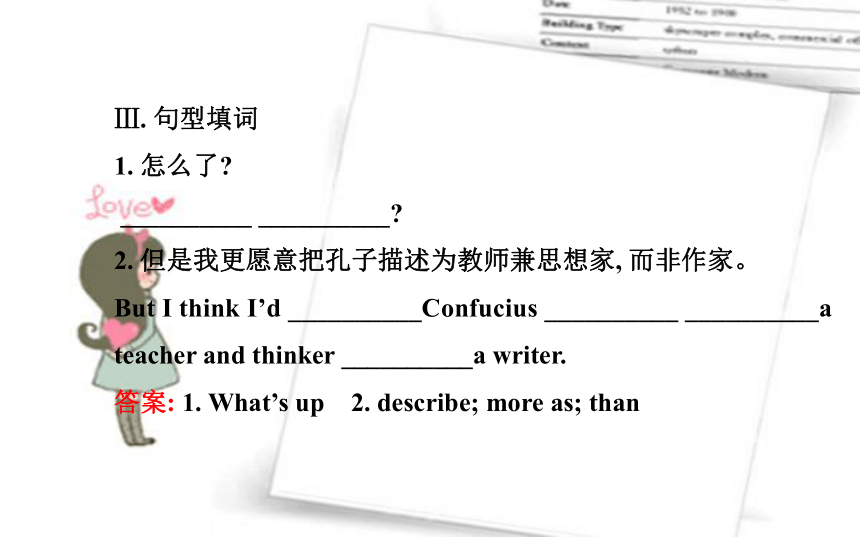
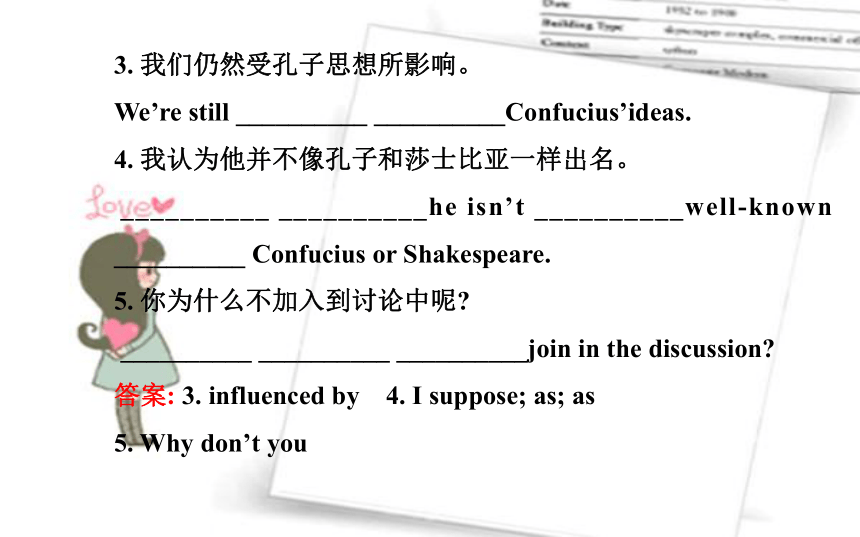
文档简介
课件95张PPT。Module 7
Great books
精讲导学 巧练激活
【导语】读一本好书就是甜美的享受。每次阅读, 犹如沐浴和煦的春风, 使你神清气爽; 每次阅读, 犹如品尝甘醇的美酒, 使你回味无穷; 每次阅读, 犹如聆听高人的谈话, 使你茅塞顿开。与书为伴, 你的人生会更精彩。 Book Lovers
I advise you to develop a love of
reading good books. Those who love
reading are really fortunate, as they
have some advantages over other
people. With books around them,
they never feel lonely. The better the books are, the happier
they will feel. From good books, they will get more than
pleasure. They gain mental food which other people can hardly provide. Great books make them wiser and more skillful in life, and do their work more efficiently. They might not read great books to improve their mind on purpose. Yet, they learn these ideas from great books little by little, and they benefit from them in their future. 【词海拾贝】
fortunate adj. 幸运的
advantage n. 优势
pleasure n. 快乐
mental adj. 精神的
skillful adj. 娴熟的
efficiently adv. 有效地
benefit vi. 获益【我的感悟】
Great books enable(使……能够)us to live a better and happier life. 好书能使我们生活得更好更幸福。Module 7 Great books
Unit 1Ⅰ. 单词拼写
1. discuss(v. ) ______________
2. well-known(adj. ) ______________
3. wise(adj. ) ______________
4. 影响(v. ) ______________
5. think(v. ) → __________(n. )思想家
答案: 1. 讨论; 谈论 2. 众所周知的; 著名的
3. 有判断力的; 明智的 4. influence 5. thinkerⅡ. 短语连线
1. millions of A. 顺便提一下
2. join in B. 合情理; 有意义
3. by the way C. 数百万的
4. make sense D. 加入Ⅲ. 句型填词
1. 怎么了?
__________ __________?
2. 但是我更愿意把孔子描述为教师兼思想家, 而非作家。
But I think I’d __________Confucius __________ __________a teacher and thinker __________a writer.
答案: 1. What’s up 2. describe; more as; than3. 我们仍然受孔子思想所影响。
We’re still __________ __________Confucius’ideas.
4. 我认为他并不像孔子和莎士比亚一样出名。
__________ __________he isn’t __________well-known __________ Confucius or Shakespeare.
5. 你为什么不加入到讨论中呢?
__________ __________ __________join in the discussion?
答案: 3. influenced by 4. I suppose; as; as
5. Why don’t youBut I think I’d describe Confucius
more as a teacher and thinker than
a writer.
____________________________________________________________________________________________________________
答案: more A than B意为“与其说……倒不如说……”, 连接形容词或名词, more than意为“不仅仅是, 超过……”, 后面接名词或数词。1. influence v. 影响; 作用于
【语境领悟】
*We’re still influenced by Confucius’ ideas.
我们仍然受孔子的思想的影响。
*What you said influenced his decision.
你的话影响了他的决定。
*Modern technology has a great influence on our life.
现代科技对我们的生活有很大的影响。【自主归纳】
(1)influence作动词, 意为“影响, 作用于”, 指人或某物对人们的思想、行为方式的作用, 后面接名词或代词作宾语。
(2)influence也可作名词, 意为“影响, 作用”。常用词组have an influence on意为“对……有影响/作用”。【学以致用】
①In fact, the non-smoking rule ______many people’s life because they have to get rid of the habit.
A. educates B. influences
C. encourages D. disappoints
②Great books have a great ______on people’s mind and they can help people understand the world better.
A. agreement B. advice
C. power D. influence2. suppose v. 猜想; 推测; 相信; 认为
【语境领悟】
*I suppose he isn’t as well-known as Confucius or Shakespeare.
我认为他并不像孔子和莎士比亚一样出名。
*You are supposed to come back before 11: 00 p. m.
你应该在晚上11点之前回来。
*It was supposed that Li Lei had his legs broken in the football match.
据猜测, 李磊是在足球比赛中摔断腿的。【自主归纳】suppose的用法
(1)suppose动词, 意为“猜测; 认为”, 后面可以接that从句作宾语。
(2)be supposed to do sth. 应该做某事。
(3)suppose还可用于句型it is/was supposed that. . . 意为“据猜测……”。【学以致用】
①(2014·河北保定期末)I was in a western restaurant for the first time. I didn’t know what I ______do.
A. was suppose B. was supposing
C. was supposed to D. was supposing to
②(2013·菏泽中考)You are ______to type quickly when talking to each other on QQ so the other person doesn’t get bored.
A. suggested B. supported
C. taught D. supposed3. make sense合情理; 明智; 有意义
【语境领悟】
*Shakespeare’s plays also make a lot of sense to us today.
莎士比亚的话剧在今天对我们也有很多意义。
*What you have said doesn’t make sense to Tom.
汤姆不明白你说的话。
*Few tourists made sense of what the guide was saying.
很少游客听得懂导游在说什么。【自主归纳】make sense的用法
make sense意为“合情理; 有意义”, 常用搭配有:
(1)make sense to sb. 意为“为某人所理解”, 指某人说的话被其他人所理解;
(2)make sense of sth. 意为“理解; 明白”, 指某人理解领会某一词句或别人说的话。【学以致用】
①你的计划花钱太多, 不合理。
Your plan costs too much money, so it doesn’t __________ __________.
②这篇短文生词太多, 我读不懂。
This passage has too many new words that I can’t __________ __________ __________it.
答案: ①make sense ②make sense ofⅠ. 用所给词的适当形式填空
1. Romance of the Three Kingdoms is still __________(read)by many people.
2. They will hold a __________(discuss)about what to do on the Earth’s Day.
3. You should read a novel carefully before __________ (review) the work.
答案: 1. read 2. discussion 3. reviewing4. As a great __________(think), his ideas are important to the politics of the world.
5. As we all know, many writers in the world are __________ (influence) by Shakespeare.
答案: 4. thinker 5. influencedⅡ. 完成句子
1. 我不知道听众是否明白我的演讲。
I wonder if the listeners could __________ __________ __________my speech.
2. 怎么了? 为什么每个人都看起来如此严肃?
__________ __________? Why does everyone look so serious?
3. 你为什么不和我们去爬山呢?
__________ __________ __________climb the mountain with us?
答案: 1. make sense of 2. What’s up 3. Why don’t you4. 顺便说一下, 我们将在星期六晚上举行英语晚会。
__________ __________ __________, we are going to hold an English evening on Saturday night.
5. 我能加入这个竞猜游戏吗?
Can I __________ __________the guessing game?
答案: 4. By the way 5. join inModule 7 Great books
Unit 2 Ⅰ. 单词拼写
1. 冒险(n. ) _____________
2. 逃离; 逃脱(v. ) ______________
3. 邻居(n. ) ______________
4. 葬礼(n. ) ______________
答案: 1. adventure 2. escape 3. neighbour 4. funeral5. 行为(n. ) ______________
6. south(n. ) → __________(adj. )南方的
7. die(v. ) → __________(adj. )死的; 去世的
答案: 5. action 6. southern 7. deadⅡ. 短语连线
1. for a time A. 为……付出代价
2. get into trouble B. 带走
3. pay for C. 一小段时间; 一度; 一时
4. run away D. 惹麻烦
5. take away E. 逃走; 逃跑Ⅲ. 句型填词
1. 他不喜欢人们告诉他要做什么。
He does not __________people __________him what to do.
2. 起初每个人看到他们都很惊奇, 但是非常开心地发现汤姆和哈克还活着。
Everyone is surprised __________ __________them at first, but very pleased __________ __________that Tom and Huck are alive.
答案: 1. like; telling 2. to see; to find3. 它(该书)讲述了年轻人如何成长、人们如何彼此相亲相爱, 以及坏人如何为他们的行为付出代价。
It tells __________young people __________, how people love each other and how bad people pay for their actions.
4. 人们认为这本书是最伟大的美国小说之一。
It is __________ __________ __________one of the greatest American stories.
答案: 3. how; grow 4. thought to be1. Why does Tom always get into trouble?
____________________________________________________________________________________________________________
2. What did Tom and Huck see after they came back home?
____________________________________________________________________________________________________________
答案: 1. Because he does not like people telling him what to do.
2. They saw their family and neighbours coming to their funeral in the church. 1. alive adj. 活着的
【语境领悟】
*Everyone is surprised to see them at first, but very pleased to find that Tom and Huck are alive.
起初每个人看到他们都很惊奇, 但是非常开心地发现汤姆和哈克还活着。
*He is the oldest Nobel Prize receiver alive in the world.
他是诺贝尔奖获得者中在世的年龄最大的人。【自主归纳】alive的用法
(1)alive为形容词, 意为“活着的, 在世的”。可作表语、定语或宾语补足语;
(2)alive作定语时后置, 即置于所修饰的名词之后。【妙辨异同】“活着”各不同【学以致用】
①(2014·天津蓟县期中)Everyone is surprised to see Tom but they are also pleased to see him______.
A. living B. alive C. lived D. to live
②(2014·湖北武汉质检)—Mr. Zhang has been made the most popular teacher in our school this year.
—He always has a way to make his class ______and interesting.
A. lovely B. lively
C. alive D. loving【授课备选】补充练习
选词填空(lively, alive, live)。
①Please tell me, Mr. Smith, how do you keep your golden fish __________?
②Although he was very old, he was a very __________ gentleman.
答案: ①alive ②lively2. get into trouble陷入困境; 惹上麻烦
【语境领悟】
*So he always gets into trouble.
所以他总是惹上麻烦。
*Mary did her best to get me out of trouble.
玛丽尽最大努力帮我摆脱困境。
*If you go against the boss, you will be in trouble.
如果你跟老板对着干, 你将会遇到麻烦的。
*He had trouble walking and his classmates sent him home.
他走路困难, 同学们就把他送回家。【自主归纳】
get into trouble意为“陷入困境”。可以单独使用, 也可与名词或代词连用。例如:
get sb. into trouble使某人陷入困境。【归纳拓展】与trouble搭配的常用短语句式
①get(sb. )out of trouble (使某人)摆脱困境, 逃离困境
②be in trouble 处于不幸; 遇到麻烦
③have trouble doing sth. 做某事有困难
④What’s your trouble? =What’s the trouble with you? 你怎么了? 【学以致用】
①考试时不要作弊, 否则的话, 你会惹麻烦的。
Don’t cheat in the exam, or you will __________ __________ __________.
②他很聪明, 能轻易地摆脱困境。
He was a clever man. It was easy for him to __________ __________ __________ __________.
答案: ①get into/be in trouble
②get out of trouble③他说理解语法规则有困难。
He said that he __________ __________ __________the grammar rules.
答案: had trouble understanding3. pay for为……付出代价
【语境领悟】
*It tells how young people grow, how people love each other and how bad people pay for their actions.
它(该书)讲述了年轻人如何成长, 人们如何彼此相亲相爱, 以及坏人如何为他们的行为付出代价。【自主归纳】
(1)pay for意为“为……付钱, 买下”, 后面接表示商品的名词或代词。
(2)pay for还用于表示抽象含义, 意为“为……付出代价”, 后面接名词或what从句。【温馨提示】pay. . . for. . . 意为“花……(钱数)买……”。例如: Mary paid 300 dollars for the skirt.
玛丽买这条裙子花了300美元。【学以致用】
①(2014·湖北武汉质检)—How much did you ______for the sweater?
—$100. It’s too expensive.
A. cost B. spend C. take D. pay
②任何犯法的人都要为此付出代价。
Anyone who breaks the law will __________ __________what he/she does.
答案: pay forⅠ. 用所给词的适当形式填空
1. He is not popular because he doesn’t like people ______ (tell)him to do this or that.
2. They often see a beggar ______ (come)to beg in the neighborhood.
3. Your ______ (act)will get yourself into trouble.
答案: 1. telling 2. coming 3. action 4. —Lily didn’t pass the Chinese exam this time!
—What? I’m really surprised ______(hear)that.
5. A new factory was built up in the ______(south)part of the town.
答案: 4. to hear 5. southernⅡ. 完成句子
1. 警方很清楚哪些人可能惹上麻烦。
The police were clear about who might __________ __________ __________.
2. 你会为你的粗心大意付出代价的。
You will __________ __________your carelessness.
3. 他被认为是世界上最富有的人。
He is __________ __________ __________the richest man in the world.
答案: 1. get into trouble 2. pay for 3. thought to be4. 要让这棵小树活下来, 你必须经常浇水。
In order to __________the small tree __________, you must water it often.
5. 丹尼曾和他的祖父在纽约生活过一段时间。
Danny lived with his grandfather in New York __________ __________ __________.
答案: 4. keep; alive 5. for a timeModule 7 Great books
Unit 3 be made into被制成……
【语境领悟】
*Why are popular books made into films?
为什么畅销书被拍成电影?
*We’re making our attic into an extra bedroom.
我们正在把阁楼改装成一间额外的卧室。【自主归纳】
(1)be made into意为“被制成……”, 表示某种原料被制成产品。
(2)make sth. into sth. 意为“把某物改成……; 把某物转变成……”。【归纳拓展】 be made构成的常见搭配+ from由……材料制成(看不出原材料)
+ of由……材料制成(看得出原材料)
+ in 出产于……(某地)
+ into 被制成……(产品)
+ by 由……制成(生产者)
+ up of 由……组成(部分或成员) be made【图解助记】【学以致用】
玻璃可以制成许多不同的东西。
Glass can __________ __________ __________many different kinds of things.
答案: be made intoⅠ. 单项选择
1. He is a clever boy and can turn a bad situation______.
A. back B. round C. away D. out
2. Tony doesn’t enjoy ______to music.
A. listen B. to listen
C. listening D. listened
3. The old woman told us her past ______the story.
A. in form B. on the form of
C. at form of D. in the form of4. This sweater is ______holes. He couldn’t wear it.
A. full of B. fill with C. full with D. filled of
5. —Shall we go swimming this Sunday?
—It ______great!
A. listens B. sounds C. hears D. looksⅡ. 完成句子
1. 我正在考虑如何写一篇有关体育的文章。
I’m __________ __________how to write an article about sports.
2. 竹子能被制成好的拐杖。
Bamboo can __________ __________ __________good walking sticks.
答案: 1. thinking about 2. be made into3. 你也想长大以后当一名英语老师吗?
Do you also want to be an English teacher when you __________ __________?
4. 我真想知道你是怎么迷路的。
I really wonder how you could __________ __________.
答案: 3. grow up 4. get lost5. 他没有参加今天的比赛, 真是太遗憾了。
__________ __________ __________ __________that he didn’t take part in today’s match.
答案: It is a pity被动语态(1)
【语境领悟】仔细观察例句并体会句式结构。
1. We’re still influenced by Confucius’ ideas.
2. Shakespeare’s plays are seen by millions of people every year.
3. Mark Twain isn’t known as a great thinker like Confucius.
4. Is Chinese learnt by more and more people from all over the world today? 【知识构建】
(一)英语中的语态
英语中动词有主动语态和被动语态两种。
(1)主动语态表示主语是动作的执行者。
(2)被动语态表示主语是动作的承受者, 在被动语态中动作的执行者有时用by引出来。 (二)被动语态的句型结构 (三)主动语态变被动语态的三个注意
(1)双宾语都作主: 当句子的谓语动词后跟双宾语时, 直接宾语和间接宾语都可作被动语态的主语, 直接宾语作主语时, 间接宾语前须加介词to(如动词give, pass, lend, show, send等)或for(如动词buy, make, draw等)。例如:
My uncle gave me a present on my birthday.
→I was given a present by my uncle on my birthday.
→A present was given to me by my uncle on my birthday. (2)莫忘记还原to: 在主动语态的句子中, 当宾语补足语为省略to的不定式时, 改为被动语态时必须还原to。常见的动词有see, feel, hear, find, make, let等。例如:
We often hear him play the guitar.
→He is often heard to play the guitar by us.
(3)介词/副词跟上去: 主动语态的谓语是动词短语时, 在变为被动语态后不可以丢掉后面的介词或副词。例如:
They often ask for some advice on how to learn English.
→Some advice on how to learn English is often asked for by them. 【学以致用】
Ⅰ. 单项选择
1. —Look at the sign on the right.
—Oh, parking ______here.
A. doesn’t allow B. isn’t allowed
C. didn’t allow D. wasn’t allowed
2. These days students in some schools ______not to use mobile phones.
A. ask B. asked C. are asked D. were asked3. Computers ______widely in our daily life.
A. use B. used
C. were used D. are used
4. He likes reading very much. Most of his money ______on books.
A. is spent B. spend
C. spends D. are spent
5. The young man was often seen ______by the lake.
A. to draw B. to drawing
C. draw D. drewⅡ. 把下列句子改为被动语态
1. The school doesn’t allow us to enter the chemistry lab without a teacher.
We ______ ______to enter the chemistry lab without a teacher.
2. Do you clean your room every day?
______your room ______every day?
答案: 1. aren’t allowed 2. Is; cleaned3. Tom gives me a book.
A book ______ ______to me by Tom.
=I ______ ______a book by Tom.
答案: is given; am given 请根据下表提供的信息, 写一篇英语短文, 介绍加拿大作家Alice Munro。 注意: 1. 所给的信息必须都用上;
2. 条理清楚, 语意连贯, 句式规范, 字迹工整;
3. 80~100个词。【思路点拨】
1. 体裁: 说明文;
2. 人称: 第三人称;
3. 时态: 一般过去时。【写作模板】【妙笔成篇】
__________________________________________________________________________________________________________________________________________________________________【参考范文】
Alice Munro is a great writer. She was born in 1931. Her father was a farmer and her mother was a teacher. She started writing in her teens and studied English in university. She got married in 1951 and had three daughters. Her first book Dance of the Happy Shade was published in 1968. This book made her famous. She won the Nobel Prize for Literature in 2013 and became the first Canadian writer to win the prize. Alice Munro’s works are mainly about women and their life. Her stories are often set in small towns.
Her books are very popular all over the world. 模块复习课
Module 7 Great booksⅠ. 词汇速记
1. 猜想; 推测(v. ) ______________
2. 有判断力的(adj. ) ______________
3. 影响; 作用于(v. ) ______________
4. 评论(文章)(n. ) ______________
5. 对话(n. ) ______________
答案: 1. suppose 2. wise 3. influence 4. review 5. dialogue 6. discuss(v. ) → ________________(n. )讨论; 谈论
7. think(v. ) → ________________(n. )思想家
8. south(n. ) → ________________(adj. )南方的
9. die(v. ) → ________________(adj. )死的
10. live(v. ) → ________________(adj. )活着的
11. act(v. ) → ________________(n. )举止; 行为
答案: 6. discussion 7. thinker 8. southern 9. dead
10. alive 11. actionⅡ. 短语互译
1. 顺便提一下 __________the way
2. 作为……而著名 be well-known________
3. 一小段时间; 一度 __________a time
4. 逃走 run________
5. 为……付出代价 pay________
答案: 1. by 2. as 3. for 4. away 5. for6. 成长; 长大 grow________
7. make sense ______________
8. get into trouble ______________
9. get lost ______________
10. join in ______________
答案: 6. up 7. 合情理; 有意义 8. 陷入困境; 惹上麻烦 9. 迷路 10. 加入Ⅲ. 句型攻关
1. 那你为什么不在网上阅读名著呢?
So __________ __________you read the great books on the Internet?
2. 今天还有许多人在研究柏拉图的著作, 我们仍然受到他的思想的影响。
Plato’s works __________still __________by many people today, and we’re still __________ __________his thoughts.
答案: 1. why don’t 2. are; studied; influenced by3. 我正在找一本名为《史蒂夫·乔布斯传》的书。
I’m __________ __________a book __________Steve Jobs: A Biography.
4. 《西游记》被认为是中国文学史上最伟大的作品之一。
Journey to the West is __________ __________ __________one of the greatest works in Chinese literature.
答案: 3. looking for; called 4. thought to be5. 《汤姆·索亚历险记》是一部充满快乐的有趣故事。
The Adventures of Tom Sawyer is a lively story __________ __________fun.
答案: full ofⅣ. 语法专练
(Ⅰ)用所给词的适当形式填空
1. In some countries, tea ________(serve)with milk and sugar.
2. His room ________(not clean)every day.
3. ________her clothes ________(wash)very often?
4. He ________(see)to play football on the playground every Sunday morning.
5. Who ________the baby ________(look)after by?
答案: 1. is served 2. isn’t cleaned 3. Are; washed
4. is seen 5. is; looked(Ⅱ)句型转换
1. Mr. Green asks the students to speak English in class. (改为被动结构)
The students __________ __________ __________speak English in class.
2. They use the machine for washing clothes. (改为被动结构)
The machine __________ __________for washing clothes.
3. The boy broke the glass this morning. (改为被动结构)
The glass __________broken __________the boy this morning.
答案: 1. are asked to 2. is used 3. was; by4. Students are allowed to ride in the school. (改为否定句)
Students __________ __________to ride in the school.
答案: aren’t allowedⅤ. 真题体验
1. (2013·白银中考)A year has four seasons and it ______twelve different star signs.
A. divided into B. is dividing into
C. divide into D. is divided into
【解析】选D。考查动词语态。句意: “一年有四个季节, 并且它被分成了12个不同的星座。”故选D。2. (2013·梅州中考)The child without parents ______good care of by his teachers in this special school.
A. is taken B. are taken C. take D. takes
【解析】选A。考查被动语态及主谓一致。当主语中有with或without短语时, 谓语动词依然与with或without前的主语保持一致, 故选A。句意: “在这所特殊的学校里, 这个没有父母的孩子被他的老师很好地照顾着。3. (2013·福州中考)—Excuse me, sir, smoking ______in the gas station.
—Oh, I’m really sorry.
A. doesn’t allow B. isn’t allowed
C. aren’t allowed
【解析】选B。考查被动语态用法。根据句意“——对不起, 先生, 在加油站不允许抽烟。——噢, 我很抱歉。”属于被动语态的否定式。主语smoking为动名词, 后接动词应用第三人称单数形式。故选B。4. (2013·北京中考)Flowers ______along the road last year.
A. plant B. planted
C. are planted D. were planted
【解析】选D。考查动词时态及语态。由句中的时间状语: “last year”可知应该用过去时态, 主语为“flowers”故用被动语态。句意: “去年, 沿着这条路种植了很多花。”故选D。5. (2013·北京中考)Our teacher often asks us ______questions in groups.
A. discuss B. to discuss
C. discussing D. discussed
【解析】选B。考查非谓语动词。ask sb. to do sth. 让某人做某事。句意: 我们的老师经常让我们分组讨论问题。故选B。6. (2013·鞍山中考)学生在校期间应该穿校服。
Students __________ __________ __________ wear school uniforms on school days.
答案: are supposed to
Great books
精讲导学 巧练激活
【导语】读一本好书就是甜美的享受。每次阅读, 犹如沐浴和煦的春风, 使你神清气爽; 每次阅读, 犹如品尝甘醇的美酒, 使你回味无穷; 每次阅读, 犹如聆听高人的谈话, 使你茅塞顿开。与书为伴, 你的人生会更精彩。 Book Lovers
I advise you to develop a love of
reading good books. Those who love
reading are really fortunate, as they
have some advantages over other
people. With books around them,
they never feel lonely. The better the books are, the happier
they will feel. From good books, they will get more than
pleasure. They gain mental food which other people can hardly provide. Great books make them wiser and more skillful in life, and do their work more efficiently. They might not read great books to improve their mind on purpose. Yet, they learn these ideas from great books little by little, and they benefit from them in their future. 【词海拾贝】
fortunate adj. 幸运的
advantage n. 优势
pleasure n. 快乐
mental adj. 精神的
skillful adj. 娴熟的
efficiently adv. 有效地
benefit vi. 获益【我的感悟】
Great books enable(使……能够)us to live a better and happier life. 好书能使我们生活得更好更幸福。Module 7 Great books
Unit 1Ⅰ. 单词拼写
1. discuss(v. ) ______________
2. well-known(adj. ) ______________
3. wise(adj. ) ______________
4. 影响(v. ) ______________
5. think(v. ) → __________(n. )思想家
答案: 1. 讨论; 谈论 2. 众所周知的; 著名的
3. 有判断力的; 明智的 4. influence 5. thinkerⅡ. 短语连线
1. millions of A. 顺便提一下
2. join in B. 合情理; 有意义
3. by the way C. 数百万的
4. make sense D. 加入Ⅲ. 句型填词
1. 怎么了?
__________ __________?
2. 但是我更愿意把孔子描述为教师兼思想家, 而非作家。
But I think I’d __________Confucius __________ __________a teacher and thinker __________a writer.
答案: 1. What’s up 2. describe; more as; than3. 我们仍然受孔子思想所影响。
We’re still __________ __________Confucius’ideas.
4. 我认为他并不像孔子和莎士比亚一样出名。
__________ __________he isn’t __________well-known __________ Confucius or Shakespeare.
5. 你为什么不加入到讨论中呢?
__________ __________ __________join in the discussion?
答案: 3. influenced by 4. I suppose; as; as
5. Why don’t youBut I think I’d describe Confucius
more as a teacher and thinker than
a writer.
____________________________________________________________________________________________________________
答案: more A than B意为“与其说……倒不如说……”, 连接形容词或名词, more than意为“不仅仅是, 超过……”, 后面接名词或数词。1. influence v. 影响; 作用于
【语境领悟】
*We’re still influenced by Confucius’ ideas.
我们仍然受孔子的思想的影响。
*What you said influenced his decision.
你的话影响了他的决定。
*Modern technology has a great influence on our life.
现代科技对我们的生活有很大的影响。【自主归纳】
(1)influence作动词, 意为“影响, 作用于”, 指人或某物对人们的思想、行为方式的作用, 后面接名词或代词作宾语。
(2)influence也可作名词, 意为“影响, 作用”。常用词组have an influence on意为“对……有影响/作用”。【学以致用】
①In fact, the non-smoking rule ______many people’s life because they have to get rid of the habit.
A. educates B. influences
C. encourages D. disappoints
②Great books have a great ______on people’s mind and they can help people understand the world better.
A. agreement B. advice
C. power D. influence2. suppose v. 猜想; 推测; 相信; 认为
【语境领悟】
*I suppose he isn’t as well-known as Confucius or Shakespeare.
我认为他并不像孔子和莎士比亚一样出名。
*You are supposed to come back before 11: 00 p. m.
你应该在晚上11点之前回来。
*It was supposed that Li Lei had his legs broken in the football match.
据猜测, 李磊是在足球比赛中摔断腿的。【自主归纳】suppose的用法
(1)suppose动词, 意为“猜测; 认为”, 后面可以接that从句作宾语。
(2)be supposed to do sth. 应该做某事。
(3)suppose还可用于句型it is/was supposed that. . . 意为“据猜测……”。【学以致用】
①(2014·河北保定期末)I was in a western restaurant for the first time. I didn’t know what I ______do.
A. was suppose B. was supposing
C. was supposed to D. was supposing to
②(2013·菏泽中考)You are ______to type quickly when talking to each other on QQ so the other person doesn’t get bored.
A. suggested B. supported
C. taught D. supposed3. make sense合情理; 明智; 有意义
【语境领悟】
*Shakespeare’s plays also make a lot of sense to us today.
莎士比亚的话剧在今天对我们也有很多意义。
*What you have said doesn’t make sense to Tom.
汤姆不明白你说的话。
*Few tourists made sense of what the guide was saying.
很少游客听得懂导游在说什么。【自主归纳】make sense的用法
make sense意为“合情理; 有意义”, 常用搭配有:
(1)make sense to sb. 意为“为某人所理解”, 指某人说的话被其他人所理解;
(2)make sense of sth. 意为“理解; 明白”, 指某人理解领会某一词句或别人说的话。【学以致用】
①你的计划花钱太多, 不合理。
Your plan costs too much money, so it doesn’t __________ __________.
②这篇短文生词太多, 我读不懂。
This passage has too many new words that I can’t __________ __________ __________it.
答案: ①make sense ②make sense ofⅠ. 用所给词的适当形式填空
1. Romance of the Three Kingdoms is still __________(read)by many people.
2. They will hold a __________(discuss)about what to do on the Earth’s Day.
3. You should read a novel carefully before __________ (review) the work.
答案: 1. read 2. discussion 3. reviewing4. As a great __________(think), his ideas are important to the politics of the world.
5. As we all know, many writers in the world are __________ (influence) by Shakespeare.
答案: 4. thinker 5. influencedⅡ. 完成句子
1. 我不知道听众是否明白我的演讲。
I wonder if the listeners could __________ __________ __________my speech.
2. 怎么了? 为什么每个人都看起来如此严肃?
__________ __________? Why does everyone look so serious?
3. 你为什么不和我们去爬山呢?
__________ __________ __________climb the mountain with us?
答案: 1. make sense of 2. What’s up 3. Why don’t you4. 顺便说一下, 我们将在星期六晚上举行英语晚会。
__________ __________ __________, we are going to hold an English evening on Saturday night.
5. 我能加入这个竞猜游戏吗?
Can I __________ __________the guessing game?
答案: 4. By the way 5. join inModule 7 Great books
Unit 2 Ⅰ. 单词拼写
1. 冒险(n. ) _____________
2. 逃离; 逃脱(v. ) ______________
3. 邻居(n. ) ______________
4. 葬礼(n. ) ______________
答案: 1. adventure 2. escape 3. neighbour 4. funeral5. 行为(n. ) ______________
6. south(n. ) → __________(adj. )南方的
7. die(v. ) → __________(adj. )死的; 去世的
答案: 5. action 6. southern 7. deadⅡ. 短语连线
1. for a time A. 为……付出代价
2. get into trouble B. 带走
3. pay for C. 一小段时间; 一度; 一时
4. run away D. 惹麻烦
5. take away E. 逃走; 逃跑Ⅲ. 句型填词
1. 他不喜欢人们告诉他要做什么。
He does not __________people __________him what to do.
2. 起初每个人看到他们都很惊奇, 但是非常开心地发现汤姆和哈克还活着。
Everyone is surprised __________ __________them at first, but very pleased __________ __________that Tom and Huck are alive.
答案: 1. like; telling 2. to see; to find3. 它(该书)讲述了年轻人如何成长、人们如何彼此相亲相爱, 以及坏人如何为他们的行为付出代价。
It tells __________young people __________, how people love each other and how bad people pay for their actions.
4. 人们认为这本书是最伟大的美国小说之一。
It is __________ __________ __________one of the greatest American stories.
答案: 3. how; grow 4. thought to be1. Why does Tom always get into trouble?
____________________________________________________________________________________________________________
2. What did Tom and Huck see after they came back home?
____________________________________________________________________________________________________________
答案: 1. Because he does not like people telling him what to do.
2. They saw their family and neighbours coming to their funeral in the church. 1. alive adj. 活着的
【语境领悟】
*Everyone is surprised to see them at first, but very pleased to find that Tom and Huck are alive.
起初每个人看到他们都很惊奇, 但是非常开心地发现汤姆和哈克还活着。
*He is the oldest Nobel Prize receiver alive in the world.
他是诺贝尔奖获得者中在世的年龄最大的人。【自主归纳】alive的用法
(1)alive为形容词, 意为“活着的, 在世的”。可作表语、定语或宾语补足语;
(2)alive作定语时后置, 即置于所修饰的名词之后。【妙辨异同】“活着”各不同【学以致用】
①(2014·天津蓟县期中)Everyone is surprised to see Tom but they are also pleased to see him______.
A. living B. alive C. lived D. to live
②(2014·湖北武汉质检)—Mr. Zhang has been made the most popular teacher in our school this year.
—He always has a way to make his class ______and interesting.
A. lovely B. lively
C. alive D. loving【授课备选】补充练习
选词填空(lively, alive, live)。
①Please tell me, Mr. Smith, how do you keep your golden fish __________?
②Although he was very old, he was a very __________ gentleman.
答案: ①alive ②lively2. get into trouble陷入困境; 惹上麻烦
【语境领悟】
*So he always gets into trouble.
所以他总是惹上麻烦。
*Mary did her best to get me out of trouble.
玛丽尽最大努力帮我摆脱困境。
*If you go against the boss, you will be in trouble.
如果你跟老板对着干, 你将会遇到麻烦的。
*He had trouble walking and his classmates sent him home.
他走路困难, 同学们就把他送回家。【自主归纳】
get into trouble意为“陷入困境”。可以单独使用, 也可与名词或代词连用。例如:
get sb. into trouble使某人陷入困境。【归纳拓展】与trouble搭配的常用短语句式
①get(sb. )out of trouble (使某人)摆脱困境, 逃离困境
②be in trouble 处于不幸; 遇到麻烦
③have trouble doing sth. 做某事有困难
④What’s your trouble? =What’s the trouble with you? 你怎么了? 【学以致用】
①考试时不要作弊, 否则的话, 你会惹麻烦的。
Don’t cheat in the exam, or you will __________ __________ __________.
②他很聪明, 能轻易地摆脱困境。
He was a clever man. It was easy for him to __________ __________ __________ __________.
答案: ①get into/be in trouble
②get out of trouble③他说理解语法规则有困难。
He said that he __________ __________ __________the grammar rules.
答案: had trouble understanding3. pay for为……付出代价
【语境领悟】
*It tells how young people grow, how people love each other and how bad people pay for their actions.
它(该书)讲述了年轻人如何成长, 人们如何彼此相亲相爱, 以及坏人如何为他们的行为付出代价。【自主归纳】
(1)pay for意为“为……付钱, 买下”, 后面接表示商品的名词或代词。
(2)pay for还用于表示抽象含义, 意为“为……付出代价”, 后面接名词或what从句。【温馨提示】pay. . . for. . . 意为“花……(钱数)买……”。例如: Mary paid 300 dollars for the skirt.
玛丽买这条裙子花了300美元。【学以致用】
①(2014·湖北武汉质检)—How much did you ______for the sweater?
—$100. It’s too expensive.
A. cost B. spend C. take D. pay
②任何犯法的人都要为此付出代价。
Anyone who breaks the law will __________ __________what he/she does.
答案: pay forⅠ. 用所给词的适当形式填空
1. He is not popular because he doesn’t like people ______ (tell)him to do this or that.
2. They often see a beggar ______ (come)to beg in the neighborhood.
3. Your ______ (act)will get yourself into trouble.
答案: 1. telling 2. coming 3. action 4. —Lily didn’t pass the Chinese exam this time!
—What? I’m really surprised ______(hear)that.
5. A new factory was built up in the ______(south)part of the town.
答案: 4. to hear 5. southernⅡ. 完成句子
1. 警方很清楚哪些人可能惹上麻烦。
The police were clear about who might __________ __________ __________.
2. 你会为你的粗心大意付出代价的。
You will __________ __________your carelessness.
3. 他被认为是世界上最富有的人。
He is __________ __________ __________the richest man in the world.
答案: 1. get into trouble 2. pay for 3. thought to be4. 要让这棵小树活下来, 你必须经常浇水。
In order to __________the small tree __________, you must water it often.
5. 丹尼曾和他的祖父在纽约生活过一段时间。
Danny lived with his grandfather in New York __________ __________ __________.
答案: 4. keep; alive 5. for a timeModule 7 Great books
Unit 3 be made into被制成……
【语境领悟】
*Why are popular books made into films?
为什么畅销书被拍成电影?
*We’re making our attic into an extra bedroom.
我们正在把阁楼改装成一间额外的卧室。【自主归纳】
(1)be made into意为“被制成……”, 表示某种原料被制成产品。
(2)make sth. into sth. 意为“把某物改成……; 把某物转变成……”。【归纳拓展】 be made构成的常见搭配+ from由……材料制成(看不出原材料)
+ of由……材料制成(看得出原材料)
+ in 出产于……(某地)
+ into 被制成……(产品)
+ by 由……制成(生产者)
+ up of 由……组成(部分或成员) be made【图解助记】【学以致用】
玻璃可以制成许多不同的东西。
Glass can __________ __________ __________many different kinds of things.
答案: be made intoⅠ. 单项选择
1. He is a clever boy and can turn a bad situation______.
A. back B. round C. away D. out
2. Tony doesn’t enjoy ______to music.
A. listen B. to listen
C. listening D. listened
3. The old woman told us her past ______the story.
A. in form B. on the form of
C. at form of D. in the form of4. This sweater is ______holes. He couldn’t wear it.
A. full of B. fill with C. full with D. filled of
5. —Shall we go swimming this Sunday?
—It ______great!
A. listens B. sounds C. hears D. looksⅡ. 完成句子
1. 我正在考虑如何写一篇有关体育的文章。
I’m __________ __________how to write an article about sports.
2. 竹子能被制成好的拐杖。
Bamboo can __________ __________ __________good walking sticks.
答案: 1. thinking about 2. be made into3. 你也想长大以后当一名英语老师吗?
Do you also want to be an English teacher when you __________ __________?
4. 我真想知道你是怎么迷路的。
I really wonder how you could __________ __________.
答案: 3. grow up 4. get lost5. 他没有参加今天的比赛, 真是太遗憾了。
__________ __________ __________ __________that he didn’t take part in today’s match.
答案: It is a pity被动语态(1)
【语境领悟】仔细观察例句并体会句式结构。
1. We’re still influenced by Confucius’ ideas.
2. Shakespeare’s plays are seen by millions of people every year.
3. Mark Twain isn’t known as a great thinker like Confucius.
4. Is Chinese learnt by more and more people from all over the world today? 【知识构建】
(一)英语中的语态
英语中动词有主动语态和被动语态两种。
(1)主动语态表示主语是动作的执行者。
(2)被动语态表示主语是动作的承受者, 在被动语态中动作的执行者有时用by引出来。 (二)被动语态的句型结构 (三)主动语态变被动语态的三个注意
(1)双宾语都作主: 当句子的谓语动词后跟双宾语时, 直接宾语和间接宾语都可作被动语态的主语, 直接宾语作主语时, 间接宾语前须加介词to(如动词give, pass, lend, show, send等)或for(如动词buy, make, draw等)。例如:
My uncle gave me a present on my birthday.
→I was given a present by my uncle on my birthday.
→A present was given to me by my uncle on my birthday. (2)莫忘记还原to: 在主动语态的句子中, 当宾语补足语为省略to的不定式时, 改为被动语态时必须还原to。常见的动词有see, feel, hear, find, make, let等。例如:
We often hear him play the guitar.
→He is often heard to play the guitar by us.
(3)介词/副词跟上去: 主动语态的谓语是动词短语时, 在变为被动语态后不可以丢掉后面的介词或副词。例如:
They often ask for some advice on how to learn English.
→Some advice on how to learn English is often asked for by them. 【学以致用】
Ⅰ. 单项选择
1. —Look at the sign on the right.
—Oh, parking ______here.
A. doesn’t allow B. isn’t allowed
C. didn’t allow D. wasn’t allowed
2. These days students in some schools ______not to use mobile phones.
A. ask B. asked C. are asked D. were asked3. Computers ______widely in our daily life.
A. use B. used
C. were used D. are used
4. He likes reading very much. Most of his money ______on books.
A. is spent B. spend
C. spends D. are spent
5. The young man was often seen ______by the lake.
A. to draw B. to drawing
C. draw D. drewⅡ. 把下列句子改为被动语态
1. The school doesn’t allow us to enter the chemistry lab without a teacher.
We ______ ______to enter the chemistry lab without a teacher.
2. Do you clean your room every day?
______your room ______every day?
答案: 1. aren’t allowed 2. Is; cleaned3. Tom gives me a book.
A book ______ ______to me by Tom.
=I ______ ______a book by Tom.
答案: is given; am given 请根据下表提供的信息, 写一篇英语短文, 介绍加拿大作家Alice Munro。 注意: 1. 所给的信息必须都用上;
2. 条理清楚, 语意连贯, 句式规范, 字迹工整;
3. 80~100个词。【思路点拨】
1. 体裁: 说明文;
2. 人称: 第三人称;
3. 时态: 一般过去时。【写作模板】【妙笔成篇】
__________________________________________________________________________________________________________________________________________________________________【参考范文】
Alice Munro is a great writer. She was born in 1931. Her father was a farmer and her mother was a teacher. She started writing in her teens and studied English in university. She got married in 1951 and had three daughters. Her first book Dance of the Happy Shade was published in 1968. This book made her famous. She won the Nobel Prize for Literature in 2013 and became the first Canadian writer to win the prize. Alice Munro’s works are mainly about women and their life. Her stories are often set in small towns.
Her books are very popular all over the world. 模块复习课
Module 7 Great booksⅠ. 词汇速记
1. 猜想; 推测(v. ) ______________
2. 有判断力的(adj. ) ______________
3. 影响; 作用于(v. ) ______________
4. 评论(文章)(n. ) ______________
5. 对话(n. ) ______________
答案: 1. suppose 2. wise 3. influence 4. review 5. dialogue 6. discuss(v. ) → ________________(n. )讨论; 谈论
7. think(v. ) → ________________(n. )思想家
8. south(n. ) → ________________(adj. )南方的
9. die(v. ) → ________________(adj. )死的
10. live(v. ) → ________________(adj. )活着的
11. act(v. ) → ________________(n. )举止; 行为
答案: 6. discussion 7. thinker 8. southern 9. dead
10. alive 11. actionⅡ. 短语互译
1. 顺便提一下 __________the way
2. 作为……而著名 be well-known________
3. 一小段时间; 一度 __________a time
4. 逃走 run________
5. 为……付出代价 pay________
答案: 1. by 2. as 3. for 4. away 5. for6. 成长; 长大 grow________
7. make sense ______________
8. get into trouble ______________
9. get lost ______________
10. join in ______________
答案: 6. up 7. 合情理; 有意义 8. 陷入困境; 惹上麻烦 9. 迷路 10. 加入Ⅲ. 句型攻关
1. 那你为什么不在网上阅读名著呢?
So __________ __________you read the great books on the Internet?
2. 今天还有许多人在研究柏拉图的著作, 我们仍然受到他的思想的影响。
Plato’s works __________still __________by many people today, and we’re still __________ __________his thoughts.
答案: 1. why don’t 2. are; studied; influenced by3. 我正在找一本名为《史蒂夫·乔布斯传》的书。
I’m __________ __________a book __________Steve Jobs: A Biography.
4. 《西游记》被认为是中国文学史上最伟大的作品之一。
Journey to the West is __________ __________ __________one of the greatest works in Chinese literature.
答案: 3. looking for; called 4. thought to be5. 《汤姆·索亚历险记》是一部充满快乐的有趣故事。
The Adventures of Tom Sawyer is a lively story __________ __________fun.
答案: full ofⅣ. 语法专练
(Ⅰ)用所给词的适当形式填空
1. In some countries, tea ________(serve)with milk and sugar.
2. His room ________(not clean)every day.
3. ________her clothes ________(wash)very often?
4. He ________(see)to play football on the playground every Sunday morning.
5. Who ________the baby ________(look)after by?
答案: 1. is served 2. isn’t cleaned 3. Are; washed
4. is seen 5. is; looked(Ⅱ)句型转换
1. Mr. Green asks the students to speak English in class. (改为被动结构)
The students __________ __________ __________speak English in class.
2. They use the machine for washing clothes. (改为被动结构)
The machine __________ __________for washing clothes.
3. The boy broke the glass this morning. (改为被动结构)
The glass __________broken __________the boy this morning.
答案: 1. are asked to 2. is used 3. was; by4. Students are allowed to ride in the school. (改为否定句)
Students __________ __________to ride in the school.
答案: aren’t allowedⅤ. 真题体验
1. (2013·白银中考)A year has four seasons and it ______twelve different star signs.
A. divided into B. is dividing into
C. divide into D. is divided into
【解析】选D。考查动词语态。句意: “一年有四个季节, 并且它被分成了12个不同的星座。”故选D。2. (2013·梅州中考)The child without parents ______good care of by his teachers in this special school.
A. is taken B. are taken C. take D. takes
【解析】选A。考查被动语态及主谓一致。当主语中有with或without短语时, 谓语动词依然与with或without前的主语保持一致, 故选A。句意: “在这所特殊的学校里, 这个没有父母的孩子被他的老师很好地照顾着。3. (2013·福州中考)—Excuse me, sir, smoking ______in the gas station.
—Oh, I’m really sorry.
A. doesn’t allow B. isn’t allowed
C. aren’t allowed
【解析】选B。考查被动语态用法。根据句意“——对不起, 先生, 在加油站不允许抽烟。——噢, 我很抱歉。”属于被动语态的否定式。主语smoking为动名词, 后接动词应用第三人称单数形式。故选B。4. (2013·北京中考)Flowers ______along the road last year.
A. plant B. planted
C. are planted D. were planted
【解析】选D。考查动词时态及语态。由句中的时间状语: “last year”可知应该用过去时态, 主语为“flowers”故用被动语态。句意: “去年, 沿着这条路种植了很多花。”故选D。5. (2013·北京中考)Our teacher often asks us ______questions in groups.
A. discuss B. to discuss
C. discussing D. discussed
【解析】选B。考查非谓语动词。ask sb. to do sth. 让某人做某事。句意: 我们的老师经常让我们分组讨论问题。故选B。6. (2013·鞍山中考)学生在校期间应该穿校服。
Students __________ __________ __________ wear school uniforms on school days.
答案: are supposed to
同课章节目录
- Module 1 Wonders of the world
- Unit 1 It's more than 2,000 years old.
- Unit 2 The Grand Canyon was not just big.
- Unit 3 Language in use
- Module 2 Public holidays
- Unit 1 My family always go somewhere interesting a
- Unit 2 We have celebrated the festival since the f
- Unit 3 Language in use
- Module 3 Heroes
- Unit 1 She trained hard,so she became a great play
- Unit 2There were few doctors, so he had to work ve
- Unit 3 Language in use
- Module 4 Home alone
- Unit 1 I can look after myself, although it won’t
- Unit 2 I became so bored with their orders that I
- Unit 3 Language in use
- Module 5 Museums
- Unit 1 Don't cross that rope!
- Unit 2 If you ever go to London, make sure you vis
- Unit 3 Language in use
- Module 6 Problems
- Unit 1 If I start after dinner, I'll finish it be
- Unit 2 If you tell him the truth now, you will sho
- Unit 3 Language in use
- Revision Module A
- Module 7 Great books
- Unit 1 We're still influenced by Confucius's idea
- Unit 2 It is still read and loved.
- Unit 3 Language in use
- Module 8 Sports life
- Unit 1 Daming wasn't chosen for the team last time
- Unit 2 He was invited to competitions around the w
- Unit 3 Language in use
- Module 9 Great inventions
- Unit 1 Will computers be used more than books in t
- Unit 2 Will books be replaced by the Internet?
- Unit 3 Language in use
- Module 10 Australia
- Unit 1 I have some photos that I took in Australia
- Unit 2 The game that they like most is Australian
- Unit 3 Language in use
- Module 11 Photos
- Unit 1 He's the boy who won the photo competition
- Unit 2 The photo which we liked best was taken by
- Unit 3 Language in use
- Module 12 Save our world
- Unit 1 If everyone starts to do something, the wor
- Unit 2 Repeat these three words daily: reduce, reu
- Unit 3 Language in use
- Revision Module B
